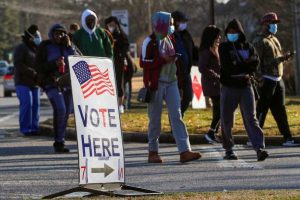'There is no middle ground' — Black CEOs urge companies to oppose restrictive voting laws

- Merck CEO Ken Frazier is helping lead an effort among Black business executives to push corporate America to be more vocal in favor of voting rights.
- "Corporations have to stand up. There is no middle ground," ex-American Express CEO Ken Chenault, another organizer, told CNBC on Wednesday.
- The effort comes following a new law in George that critics say will disproportionately hurt voters of color.
In this article
- SBUX
- AXP
- UBER
- MRK
A group of Black business executives are imploring corporate leaders in the U.S. to take forceful stands against efforts to restrict voting access, following a new law in Georgia that critics say will disproportionally hurt voters of color.
Two of the organizers — Merck CEO Ken Frazier and Ken Chenault, former American Express CEO — appeared Wednesday on CNBC's "Squawk Box," describing the effort as a moral obligation in the face of longstanding injustices faced by Black voters.
"Corporations have to stand up. There is no middle ground," said Chenault, who was one of the first Black chief executives at a Fortune 500 company. "This is about all Americans having the right to vote, but we need to recognize the special history of the denial of the right to vote for Black Americans, and we will not be silent," he added.
Republicans lawmakers in Georgia supported the state's recent legislation, and Democrats opposed it. Former President Donald Trump, who lost to Biden, and other Republicans have falsely claimed that Georgia's election last year was rife with voter fraud. President Joe Biden in November became the first Democrat to win Georgia since 1992, and two Democrats — Sens. Raphael Warnock and Jon Ossoff — also defeated their GOP opponents in runoff elections.
Civil rights groups in Georgia have been critical of some of the state's largest companies for not being more vocal and direct in opposing the legislation before it was signed into law last week by GOP Gov. Brian Kemp, who was not immediately available to respond to CNBC's request for comment about the remarks by Frazier and Chenault and their voting rights letter.
Frazier pushed back strongly on the suggestion that, by specifically condemning the Georgia changes and similar efforts being pushed in other states, corporations would mistakenly wade into tangles of partisan politics.
"If we allow a party to adopt as one of its fundamental strategies voter suppression, then I don't think the answer should be, 'Well we can't comment on voter suppression because otherwise we're being partisan,'" said Frazier, who is set to retire as Merck CEO later this year after a decade at the helm. "Free and fair access to the ballot was never a partisan issue. It's a fundamental constitutional right."
For the Georgia law, in particular, Frazier stressed he was not claiming every single provision was restrictive and hurt Black voters. For example, proponents of the bill note it mandates two Saturdays of early voting leading up to general elections, when previously only one had been required.
Many other aspects are problematic, Frazier contended, such as limits on the locations and accessibility of ballot drop boxes, as well restrictions on giving food and water to voters while they wait in line. "In totality, these changes will make it much harder for certain voters to vote," he said.
"There's already not equal access," Frazier added, referencing data that shows longer wait times for Black voters in Georgia than white counterparts. "What we're saying is that state by state, in the absence of substantiated and compelling evidence of voter fraud, any actions that are taken to restrict the ability of eligible voters to vote should be opposed," he said.
Among the dozens of business leaders backing Frazier and Chenault's efforts is Mellody Hobson, co-CEO and president of Ariel Investments. Hobson earlier this month became chair of Starbucks' board. She's the only Black chairwoman of an S&P 500 company. Tony West, chief legal officer at Uber, and Vista Equity Partners founder and CEO Robert Smith also signed the letter organized by Frazier and Chenault, which was published as an ad in Wednesday's edition of The New York Times.
While there are legal challenges underway to Georgia's law, Frazier said he was particularly concerned about restrictive voting proposals being introduced in other states.
"Georgia is the leading edge of a movement all around this country to restrict voting access," Frazier said. He added, "These kinds of bills have to be stopped in their tracks because you have to actually spend time reading this bill to understand what it does, and I think corporations ought to take a very strong stand in Georgia and every place else."
Companies have to recognize their power to create change on critical aspects of democracy, Chenault said. "If they can't speak out on this issue, what can they speak out on?" he asked, rhetorically. "People should not be focused on, 'Will it hurt me if I take a stand?" he added.
"With all due respect, many people died for the right to vote, and this one where we're asking corporations to take a moral stand. If corporations had done this throughout our history, we would be far further along in race relations in this country," Chenault concluded.
— CNBC's Hannah Miao contributed to this report.
Source: Read Full Article
